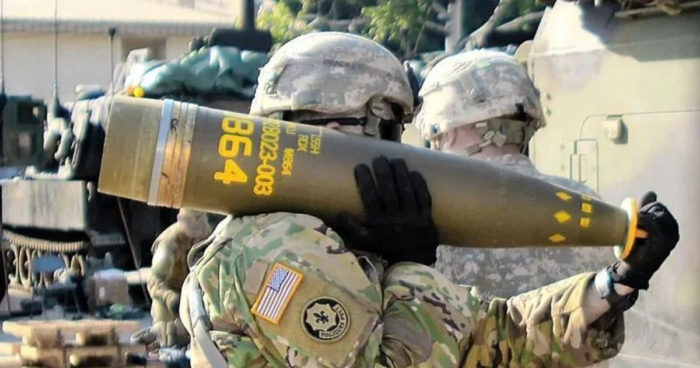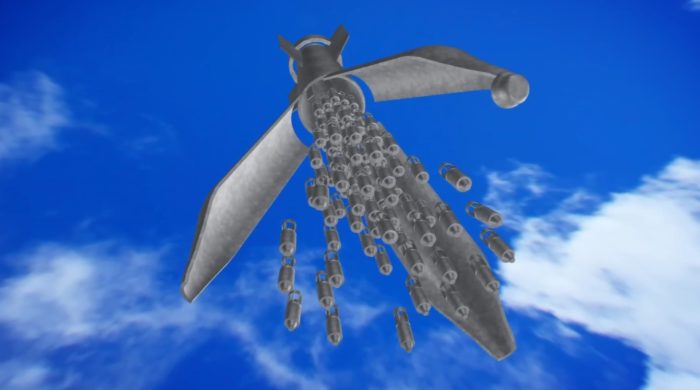The USA's long-awaited decision to send cluster munitions to Ukraine was met with approval by military experts, who say they will give Ukraine the upper edge, and caution by human rights organizations like Human Rights Watch and Amnesty International, which called on the USA not to supply them to Ukraine. We talk to security analyst Mykhailo Samus to understand what they will change on the battlefield.

Mr. Samus does not see any special timing in the US' decision to deliver cluster munitions to Ukraine: it is all part of the USA's strategy to drip-feed weapons to Ukraine to avoid provoking Russia:
"I remember how difficult it was when they first gave us the Javelin anti-tank missiles. So all of this relates more to the internal kitchen of the Biden administration, just like they don't give us attack helicopters, for example," Samus says, clarifying that there are theories that White House officials such as Sullivan and Blinken are being blackmailed by Moscow, and Russia is constantly threatening that if red lines are crossed, it will reject the possibility of negotiations altogether.
"Biden's team is convinced that Russia cannot be left without a final maneuver," Samus says.
Why did the USA decide to transfer these munitions now?
The USA decided to provide these munitions now simply because they are helping Ukraine and the time has come when they decided it can be done.
I simply don't understand why there is such interest. This interest in these munitions is simply due to the activities of non-governmental organizations, of a certain orientation, who believe that these ammunition somehow tear off heads and arms differently. I don't think so. And there can be no moralizing conversations when we defend ourselves on our own land. We have the right to use anything to push out the aggressors.
Regarding indiscriminate harm to the population -- all these arguments may apply to some conflicts, but they do not apply at all to Russia's war against Ukraine. Especially since Russia is constantly using cluster munitions itself, and Ukraine is in an absolutely unfair situation.
Moreover, Russia uses outdated ammunition, both conventional and cluster, which often does not explode and creates the same danger that these organizations talk about. As for American or other NATO countries' ammunition, they are new and effective. And the rate of guaranteed detonation is very high, close to 2%. In Russia, tens of percent do not explode.
So here, to be honest, the whole debate is overblown, it makes us talk about whether there will be danger from the fact that Ukraine will kill more Russians. I don't know what danger there can be."
Why do Human Rights Watch and Amnesty International oppose the US' transfer of cluster munitions to Ukraine?
"Amnesty International has even earlier said that the Ukrainian army exposes the population of Ukraine to danger by defending Ukrainian cities. So, what human rights organizations say is not always logical and does not even necessarily fit into moral principles.
I think there are many cases when people simply do not understand or distinguish between a conflict in Africa, Latin America, Asia, and in Ukraine, for example, Russia's aggression against Ukraine. And if you apply the same criteria, it can go too far.
Of course, there is a convention on the prohibition of cluster munitions. Many countries have joined, but Ukraine, Russia, the US, for example, did not join. Because they believe that the use of such ammunition is justified and fair for the West. If the aggressor can be destroyed more efficiently, then this in no way violates human rights. On the contrary, justice comes faster.
That's all. So there are different opinions in the world, but again, there are different conflicts, there are different cases.
In our case, it seems to me, one cannot justify demands that we need to use 100 rounds of expensive single ammunition to destroy Russians instead of using five rounds to destroy the same amount with cluster munitions.
The logic and motive is absolutely clear. Ukraine's Western partners still cannot cope with supplying enough ammunition to Ukraine, and using cluster munitions will help while they increase the production of 150 mm ammunition for Western artillery systems."
What exactly can these munitions change on the battlefield for Ukraine?
"You can destroy a greater number of enemy soldiers with fewer munitions. Every munition contains several smaller munitions, which are dispersed over a larger area and have much greater destructive and lethal power.
They will enhance Ukraine's use of artillery in the ongoing counteroffensive. Russia has created defensive positions with trenches, with various engineering defensive constructions. It is extremely important to inflict maximum damage and destruction on the enemy with artillery so that when our troops begin a direct offensive on this territory these positions are cleared of personnel.
And of course, if artillery has the ability to work on these positions more intensively and efficiently, it accelerates and makes offensive actions more effective. Therefore, cluster munitions are indeed very effective during an offensive."
What other types of munitions could be useful for Ukraine right now?
"Mainly, discussions are about long-range systems, missiles. Macron said he will give us French Scalp cruise missiles, this is an analogue of the British Storm Shadow, which is already in our arsenal. So ATACMS remains, and then Ukraine will already have missile systems up to 300 km, which will strike the entire depth of the front.
So far we only have HIMARS, where 70 km is the maximum, and this is clearly not enough."

Must territory be demined in a special way following the use of cluster munitions to avoid civilian damage?
"Absolutely not. If conventional munitions are low quality, like the Russians use, they are also dangerous in the same way, as the single shells do not explode and present danger by lying there. If we are talking about low-quality cluster munitions that Russians use, then indeed the unexploded ordnance covers a wider area, and it needs to be demined from ammunition. But the 2% dud rate of the US' cluster munitions -- this is quite permissible, and in principle, no ammunition has a 100% explosion rate. So, the use of these munitions will not lead to any cluttering of territory with unexploded shells.
In general, all territory must be cleared of munitions following the cessation of military activities, regardless of whether cluster munitions are used or not, because conventional munitions can accidentally not explode, either. When the munitions are of low quality, there may be more contamination with cluster munitions than with the conventional type, but with high-quality munitions, it's another story.
After hostilities, area clearance measures will be taken, along with demining. Munitions that did not explode will be searched for and disabled. In general, all areas of active combat need such special measures, when sappers and special teams go out. Ukraine's Western partners will help in this, maybe the UN will somehow get involved, because, of course, Ukraine will not cope with this alone. It now has the greatest mined territory in the world. This is only mining, and I'm not even mentioning munitions that may accidentally not explode and be scattered throughout the area of active combat."
Am I right in understanding that cluster munitions are no more dangerous than conventional ones, since everything will need to be cleared anyway?
"Absolutely. That is, everything still needs to be cleared. You cannot return immediately. When de-occupation happens, of course, special units, engineering, sapper units will enter. They will conduct a study of this territory and then they will identify minefields and areas of concentrated munitions, which may be abandoned somewhere or simply did not explode.
So even if some cluster munitions did not explode, in principle, the threat will be the same as from conventional ammunition that also did not explode."
What are cluster munitions?
Cluster munitions, defined as “a conventional munition that is designed to disperse or release explosive submunitions, each weighing less than 20 kilograms," are controversial because the submunitions have high dud rates, which act like landmines and can injure civilians.
"For this reason, the Convention on Cluster Munitions was established. Signed by 123 nations, it came into effect in 2010. The convention prohibits using, developing, producing, acquiring, stockpiling, or transferring cluster munitions," CSIS explains.
The cluster munitions the USA is sending to Ukraine have a dud rate of around 2.35%, while the cluster munitions used by Russia are much higher, near 40%, according to CSIS.
Russia, Ukraine, and the United States have not signed the convention. The United States has not signed because it wants to retain the right to use such munitions in combat emergencies. During the Cold War, cluster munitions were the USA's primary kind of munition, and although production has stopped since 2008, but stockpiles remained. It is from these stockpiles from which the USA is going to send the cluster munitions to Ukraine.

